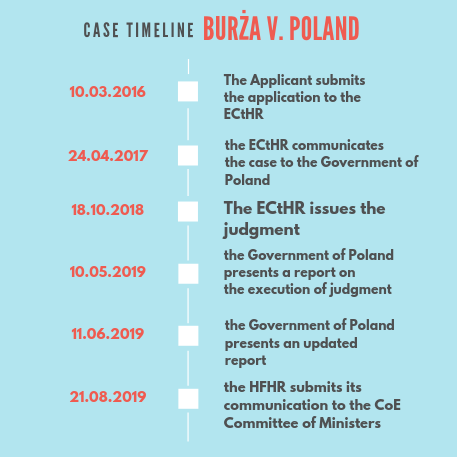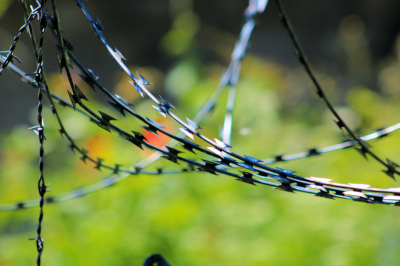
In September, the Council of Europe’s Committee of Ministers will again discuss the execution of the judgments of the European Court of Human Rights. Currently, the Committee supervises the execution of judgments in 94 “Polish” cases. One of them is the judgment in Burża v. Poland, the case involving the issue of long-term pre-trial detention. Prior to the coming session, the HFHR has submitted its position to the Committee arguing that the Committee should continue to supervise the execution of the Strasbourg judgment by the Polish authorities.
ECtHR’s judgment in the case of pre-trial detention lasting for over three years
In the case of Burża v. Poland, the European Court of Human Rights found that there had been a violation of Article 5 § 3 of the Convention due to an excessive length of the applicants’ pre-trial detention, which lasted 3 years, 2 months and 9 days. Moreover, the ECtHR noted that: “… in all the decisions extending the applicant’s detention, no other specific substantiation of the risk that the applicant would tamper with evidence, persuade other persons to testify in his favour, abscond or otherwise disrupt the proceedings, emerged. Moreover, the reasons for detention were very often identical with regard to all co-accused and did not include arguments pertaining specifically to the applicant…. Therefore, with the passage of time, the grounds relied on became less relevant and cannot justify the entire period of over three years and two months during which the most serious preventive measure against the applicant was imposed.”
A Strasbourg judgment is not the end
After a judgment is delivered by the European Court of Human Rights, the Council of Europe’s Committee of Ministers becomes responsible for supervising the judgment’s execution. Non-governmental organisations are in position to submit their communications to the Committee. The HFHR does this a regular basis so as to notify the Committee of Ministers of any actions taken on the national level after the judgment has been issued and to provide directions and recommendations for the domestic authorities.
HFHR’s communication to the CoE Committee of Ministers
The HFHR commented on the Burża case in a communication sent to the Council of Europe’s Committee of Ministers. In the Foundation’s opinion, the Committee should continue its supervision of the execution of the judgment in Burża because the problem of applying a custodial preventive measure has not been solved by the Polish authorities.
“In our communication we cited the findings of the Committee Against Torture announced in September, which indicated the need to introduce legislative changes to the Polish legal system that could help to reduce the application of pre-trial detention in general and to address the problem of prolonged pretrial detention”, says Katarzyna Wiśniewska, a lawyer working with the HFHR.
The HFHR also relied on statistical data on pre-trial detention from the last 10 years. They indicate that between December 2015 and May 2019 the number of persons placed in pre-trial detention rose from 4,162 to 8,365.
“We wanted to attract the attention of the Committee to the fact that in cases pending before regional courts the number of individuals held in pre-trial detention for a period of 1 year to 2 years increased from 490 in 2016 to 727 in 2018. Also in cases pending before regional courts, there has been an increase in the number of persons whose pre-trial detention exceeded 2 years: from 221 in 2017 to 261 in 2018”, says Adam Klepczyński, a member of the HFHR’s legal team.
Moreover, the Foundation pointed out that the recently adopted amendment to the Criminal Code and Code of Criminal Procedure will affect the practice of applying pre-trial detention as well.
Committee’s September meeting
In September, representatives of the Council of Europe’s Member States will be reviewing the manner in which judgments of the Strasbourg Court are implemented.
On 25 September, the Council of Europe’s Committee of Ministers will announce which judgments of the ECtHR it considers having been executed. At the same time, the Committee’s delegates will notify the cases in which additional measures should be taken to prevent further violations of the European Convention on Human Rights.
Case timeline:
⇒ 10 March 2016 – The Applicant submits the application to the ECtHR
⇒ 24 April 2017 – the ECtHR communicates the case to the Government of Poland.
⇒ 18 October 2018 – the ECtHR issues the judgment
⇒ 10 May 2019 – the Government of Poland presents a report on the execution of judgment
⇒ 11 June 2019 – the Government of Poland presents an updated report
⇒ 21 August 2019 – the HFHR submits its communication to the CoE Committee of Ministers

